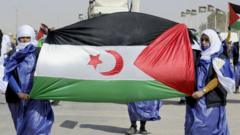In a notable diplomatic move, the UK has officially backed Morocco's plan to resolve the territorial dispute over Western Sahara, coinciding with potential investment opportunities tied to the 2030 men's football World Cup that Morocco will co-host with Spain and Portugal. Historically, the UK has maintained a neutral stance regarding Western Sahara, recognized as a "non-self-governing territory" by the United Nations. However, UK Foreign Secretary David Lammy's recent visit to Rabat included an endorsement of Morocco’s autonomy proposal, now regarded as the “most credible, viable, and pragmatic basis for a lasting resolution” by UK officials.
During his visit, Lammy also signed agreements that promise to enhance cooperation on infrastructure projects aimed at the World Cup, emphasizing that British businesses could significantly benefit from these developments. He remarked, "British businesses will score big on football's biggest stage," highlighting the economic incentives of this new partnership.
Algeria, a major supporter of the Western Saharan independence movement, expressed disappointment at the UK’s shift, pointing out that Morocco's autonomy plan has been stagnant for 18 years without engaging the Sahrawi people in meaningful negotiations. The region has been a source of conflict for five decades, with Morocco controlling a significant portion of the mineral-rich territory while the Polisario Front, advocating for independence, controls other areas.
The African Union supports Western Sahara's right to independence, but recent international trends have seen increased backing for Morocco's claims, with notable affirmations from countries like the United States and Spain. The UK's recent change in stance appears driven by the desire for business agreements and Morocco’s pledge to continue discussions around self-determination and a forthcoming revision of its autonomy plan.
According to British diplomats, this support, however, is contingent upon Morocco's acceptance of negotiations and updates on the autonomy plan. The procurement agreement signed contributes to creating avenues for UK companies to access Moroccan public tenders, targeting sectors such as health and the renovation of key infrastructures like Casablanca's airport.
The joint statement from both parties reaffirmed commitments to peaceful conflict resolution and respect for self-determination. Historically, the UK has maintained that the status of Western Sahara was "undetermined," previously advocating for the self-determination of its inhabitants.
Following decades of strife, ceasefires were established in the 1990s, but a promised UN referendum to let the Western Sahara people choose between independence and Moroccan governance has yet to occur, contributing to ongoing tensions in the region.
During his visit, Lammy also signed agreements that promise to enhance cooperation on infrastructure projects aimed at the World Cup, emphasizing that British businesses could significantly benefit from these developments. He remarked, "British businesses will score big on football's biggest stage," highlighting the economic incentives of this new partnership.
Algeria, a major supporter of the Western Saharan independence movement, expressed disappointment at the UK’s shift, pointing out that Morocco's autonomy plan has been stagnant for 18 years without engaging the Sahrawi people in meaningful negotiations. The region has been a source of conflict for five decades, with Morocco controlling a significant portion of the mineral-rich territory while the Polisario Front, advocating for independence, controls other areas.
The African Union supports Western Sahara's right to independence, but recent international trends have seen increased backing for Morocco's claims, with notable affirmations from countries like the United States and Spain. The UK's recent change in stance appears driven by the desire for business agreements and Morocco’s pledge to continue discussions around self-determination and a forthcoming revision of its autonomy plan.
According to British diplomats, this support, however, is contingent upon Morocco's acceptance of negotiations and updates on the autonomy plan. The procurement agreement signed contributes to creating avenues for UK companies to access Moroccan public tenders, targeting sectors such as health and the renovation of key infrastructures like Casablanca's airport.
The joint statement from both parties reaffirmed commitments to peaceful conflict resolution and respect for self-determination. Historically, the UK has maintained that the status of Western Sahara was "undetermined," previously advocating for the self-determination of its inhabitants.
Following decades of strife, ceasefires were established in the 1990s, but a promised UN referendum to let the Western Sahara people choose between independence and Moroccan governance has yet to occur, contributing to ongoing tensions in the region.






















